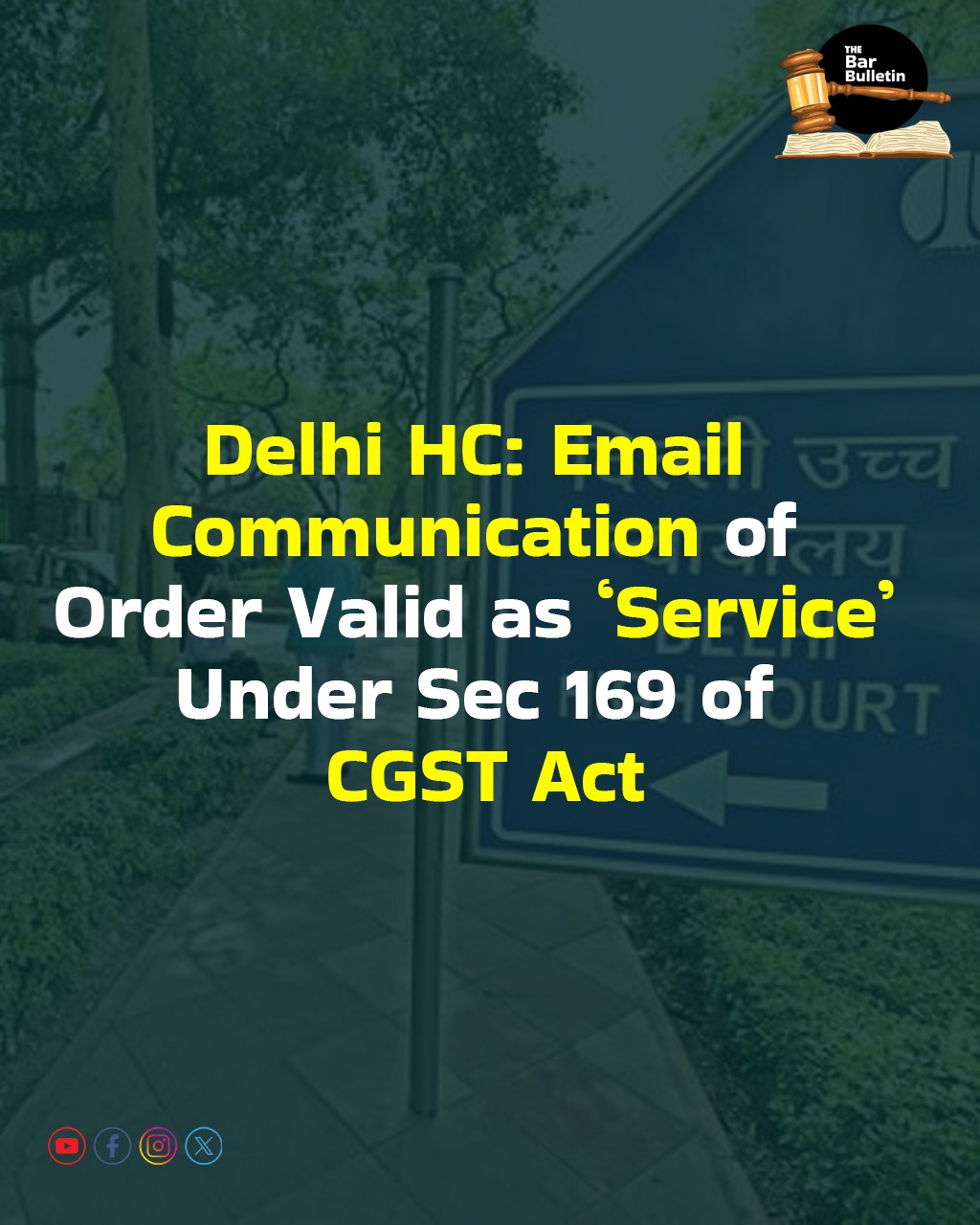While pointing out that there is a difference between the issuance of an order and deemed service under Section 169(2) of the CGST Act, the Delhi High Court emphasized that the issuance of the order is what is required under Section 74(10), and service through a mode that would constitute deemed service of the order is not mandated. Therefore, communicating an order by email would be sufficient service in terms of Section 169 of the CGST Act for constituting the issuance of an order.
The Division Bench comprising Justice Prathiba M. Singh and Justice Shail Jain observed that the term issuance of an order has to be interpreted in the context of Section 169 of the CGST Act and Rule 142 of the CGST Rules. Under the scheme of Section 169, the usual modes of service are stipulated, and some modes of service are also construed as ‘deemed service’ under Section 169(2). The usual modes of service could be physical service, registered post, speed post, courier, email, uploading on the common portal, affixation, etc. In the case of some modes of service, the service is deemed to have been effected. However, the Bench clarified that it cannot be argued that only when the service is done by any of the deemed service modes, the order would stand issued. The issuance of the order in any of the stipulated modes of service would constitute service.
The Bench pointed out that service of notice/ SCN can be effected by any one of the modes, namely, (i) through physical tendering, or (ii) by registered post or speed post, or courier with acknowledgment due, or (iii) by a communication to the email address, or (iv) uploading on the common portal, or (v) by publication in a newspaper or by affixation, as prescribed under Section 169 of the CGST Act. As far as the contention of the Petitioner that the email communication of the impugned order cannot constitute valid ‘service’ since email as a mode of communication would not fall into the scope of ‘deemed service’ under Section 169(2) of the CGST Act, the Bench clarified that DRC-07 is merely a summary of the order issued and upon the impugned order being issued to the Petitioner via email, the amount that is demanded is clearly decipherable from the order itself.
Further, finding that there is a maze of transactions, which may be spreading over various financial years, the Bench observed that an SCN or an order passed under Section 74 of the CGST Act relating to fraudulent availment of ITC can relate to multiple financial years. Coming to the issue of whether there is sufficient ground to invoke the extended period of limitation under Section 74 of the Act, the Bench concluded that Section 74 can be invoked in circumstances where there is an allegation of fraud, wilful misstatement, or suppression.
Since in the present case, the impugned order as well as the impugned SCN itself reveal that the investigation was commenced sometime in October 2023 when the information was received from the investigation wing, and immediately, thereafter, Padmavat Industries and D S Enterprises have been investigated, resulting in a finding regarding fraudulent availment and passing on of the ITC, the Bench opined that the extended period of limitation would obviously apply. Accordingly, the Bench dismissed the petition in favour of the GST Department; however, it permitted the Petitioner to file the appeal under Section 107 of the CGST Act before the Appellate Authority along with the requisite pre-deposit.
Briefly, in this case, an investigation was initially started against M/s Padmavat Industries, based in Anand Parbat Industrial Area, Central Delhi, based on the information received from the Directorate of Analytics and Risk Management (DGRAM), alleging that it did not exist at its principal place of business. Later, one M/s DS Enterprises was identified as one of the recipients of goods from M/s Padmavat Industries, and the investigation of the premises revealed that said DS Enterprises was also non-existent at the declared place of business. Accordingly, the Department concluded that bogus and non-existing firms have obtained GST registration merely to avail of illegal ITC without any receipt of the goods themselves, which culminated in retrospective cancellation of the GST registration. All the 89 entities to whom DS Enterprises had issued invoices were given notices, and the entire transaction totalled to a sum of Rs. 26.42 crores. Resultantly, penalties were imposed on several of the noticees, including the Petitioner, a trader, who was imposed with tax and penalty to the tune of Rs. 51.87 lacs, for the wrongful availing of the ITC.
Case Distinguished:
L&T Hydrocarbon Engineering Ltd. v. Union of India, [R/Special Civil Application No.11308 of 2019 decided on 3rd February, 2022]
Appearances:
Advocates Abhishek Garg & Yash Gaiha, for the Petitioner/ Taxpayer
Advocates Aditya Singla, Shreya Lamba, Ritwik Saha, and Arya Suresh, for the Respondent/ Revenue



